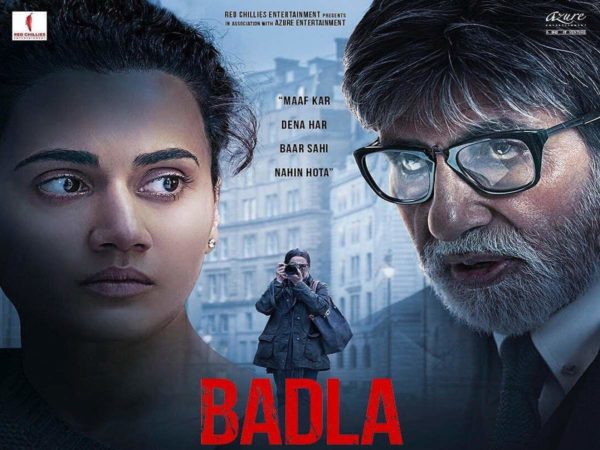Agatha Christie said “Evil is not something superhuman, it is something less than human.” Evil demands a cold passion that is borne not out of genius but is characteristic of the unfeeling. It requires an approach to the job which is a consequence of sheer expediency and totally eliminates the moral compass. This was what exemplified much of the bestselling writers’ work and was typical of the dark and somber mood that most of her novels set in the English countryside represented.
The characters displayed the classic British penchant for understatement and uninhibited pragmatism. The cast in Sujoy Ghosh’s Bachchan starrer ‘Badla’ based on the Spanish ‘’The Invisible Guest’ draws its inspiration from similar characters and is a departure from the Indian whodunit as it adopts the detachment and dark humor of its western counterpart and seems to wholly embrace ‘revenge is a dish best served cold’ stance. It then becomes a battle to establish the superior wit, and therefore the victor often has to rely on unfair stratagems to win the battle.
This does not of course imply that the agent of justice is more grey than good but that he has to keep it simple and commonsensical so that he can outthink his opponent by playing the game on a common pitch. Hitherto this unfeeling character had been the preserve of the psychotic serial killer in Bollywood and was perpetually justified by the mandatory sequence where the protagonist railed at the injustices of the system. In the process the audience expended their emotional energy much before the denouement as the plot and the resolution could not build up to a climax in the real sense of the term.
The scenes in the film are understated best exemplified when Badal Gupta, with a reputation that precedes him, refuses to resort to hyperbole in his response even as Taapsee announces that he has never lost a case in his career.
In Badla both the guilty party and the deliverer of justice go about their business without bothering to set the terms of engagement. There are busy in the game of one-upmanship and the drama plays out on its own. The characters present their own versions of the truth which again is as ambiguous as it could get for the simple reason that we don’t know who in the battle represents justice and what is illegal. Is it the lawyer who is willing to take up cudgels for the guilty or is it the woman who is willing to commit perjury to prove her apparent innocence !
This interplay of the main personae without the mandatory emotional investment forms the basis of the plot as the other characters break in from time to time. It is this singular trait that makes ‘Badla’ standout from the Bollywood thrillers in this genre. The moral turpitude of Taapsee’s character when it is revealed that she made no attempt to rescue her victim even after she realizes that he is not dead is matched by Badal Gupta’s indignation at her wickedness but he recovers to get onto the job at hand. What however works to the advantage of the film is that the viewer does not get to figure out which way the storyline is moving and both the protagonists are willing participants in this narrative. Though the content has been localized to suit Indian sensibilities, it is subtle, nowhere more prominent than Amrita Singh’s reactions as a grieving mother. She is willing to forgive and forget only if she finds out where her son is.
Denied this courtesy she turns into a cool calculated vigilante ready to wreak vengeance on the guilty. The tone of her threat is typically bollywoodish but the words are carefully chosen “tum jaanti nahin main kya kar sakti hoon” setting the tone for the unpredictable nature of the plot (in strictly Bollywood terms) as the viewer tries to figure out if their guess is as good as hers.
Article By : Shantanu Sharma



Leave a reply